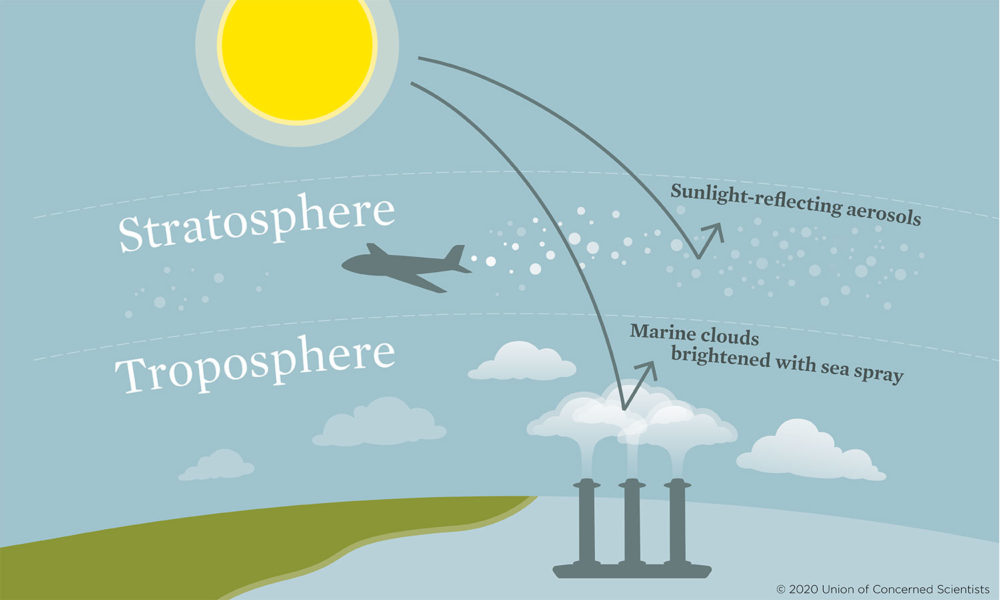As a Science Fellow at the Union of Concerned Scientists, I’ve been working on the important topic of solar geoengineering research governance with my colleagues.
An important part of governance that is often not highlighted is meaningful public participation. For the past several months, I’ve taken the opportunity to talk to a range of experts and practitioners, working at the nexus of climate change, geoengineering research, and public participation. I’ve been able to better understand the importance of engaging more people in this topic and the benefits of inclusive public input into decisionmaking.
While there are many views on this controversial topic, I am pleased to share the result of our work: a new issue brief that looks at the essential role of public participation for solar geoengineering research and provides UCS recommendations for decisionmaking on atmospheric experiments.
Public participation in emerging technologies
Public participation in the consideration of emerging technologies–from genome editing to autonomous vehicles to solar geoengineering–is an essential part of responsible research. When done in a meaningful way, public input builds trust in and legitimacy for research, brings new ideas to the fore, and can reduce inequities in decisionmaking processes. When these discussions take place early in the research process, they can also identify areas of controversy and highlight key social questions on such technologies–questions that would follow these technologies for their duration.
But implementing public participation in a meaningful way is not easy, especially when it comes to technologies that have global consequences at a time when science is losing trust in the public eye. We’ve seen instances of important strides forward in areas like nanotechnology, where national research and development legislation included specific language that highlighted and called for public participation. But there are also instances where we are quite far from the goal posts, like the ongoing controversies surrounding CRISPR and lack of public understanding or oversight. (More on both of these in the issue brief!)
So where is solar geoengineering research in this spectrum?
Solar geoengineering and atmospheric experiments
Solar geoengineering describes a set of proposed approaches to limit global warming by reflecting sunlight to cool the planet. The most widely discussed approaches are stratospheric aerosol injection (SAI), a method that would simulate volcanic eruptions by injecting aerosols into the stratosphere to reflect sunlight, and marine cloud brightening (MCB), a method where aerosolized sea salt would be sprayed into marine clouds to enhance their reflectivity.
Solar geoengineering could reduce temperatures for a relatively low direct financial cost. However, such measures come with significant risks and uncertainties: scientists do not yet understand the impacts of such measures on global weather patterns, there are legitimate risks to geopolitical stability, and these approaches do not address the underlying cause of climate change. But when considered as part of a portfolio of approaches to address climate change, solar geoengineering could limit harm while we scale up efforts to reduce global warming emissions, adapt to the climate impacts that will be unavoidable, and remove carbon from the atmosphere.
Solar geoengineering research is in nascent stages, and has been limited thus far to computer modeling and natural observations. More modeling research is certainly needed, and there are now proposals for small-scale atmospheric experiments.
Atmospheric experiments for solar geoengineering are a large step, even for experiments that are small in scale, as they raise important questions and implications for the prospects, risks, and governance of larger-scale tests and potential deployment. These experiments deserve scrutiny over not just the direct risks of an experiment, but also the transparency and accountability of the institutions behind these experiments and of the rules by which these experiments would be conducted.
We at UCS believe that these small-scale experiments must meet certain criteria before going forward: there should be legitimate governance mechanisms in place; negligible environmental, social, and legal risks; and meaningful public and stakeholder engagement within and beyond the areas where experiments are proposed to take place.
To date, questions about the future of solar geoengineering research on whether and how it should proceed have been debated outside of public view with few pathways for publics to provide meaningful input. This is especially true for governments, researchers, and civil society in the Global South. Societal decisions about solar geoengineering approaches, both their role and research on them, must be built on a more inclusive and deliberative platform. Proposed outdoor solar geoengineering experiments can serve as tangible touchstones for larger societal discussions of whether and under what conditions solar geoengineering should be considered.
Moving forward
To better understand how the research community should move forward, we conducted interviews with experts in ethics, social science, and solar geoengineering engagement. With this invaluable input, along with the US EPA Public Participation Guide and academic literature, I am excited to release this new issue brief that describes the importance of public and stakeholder engagement in solar geoengineering research and provides recommendations for atmospheric experiments moving forward.
For example, an engagement process for an atmospheric experiment must ensure that climate vulnerable and marginalized communities are integral participants. Importantly, funders play an important role in requiring and providing resources to make this engagement possible.
One of my biggest takeaways from this work is that public participation is not just a way for civil society to contribute to science, but for science to contribute to equity and inclusion.
Science plays an incredibly important role in society in countless ways, but is an institution itself that must be held accountable. Public participation is an opportunity for new and diverse thought, as well as a way to ensure responsible and inclusive decisionmaking.
Read our new issue brief in full: “Strengthening Public Input on Solar Geoengineering Research: What’s Needed for Decisionmaking on Atmospheric Experiments.”

